Hyundai Nexo VS Jeep Compass – Specs, Efficiency & Price Comparison
Which model is the better choice – the Hyundai Nexo or the Jeep Compass? We compare performance (163 HP vs 240 HP), boot capacity (461 L vs 438 L), efficiency ( vs 2 L), and of course, the price (66400 £ vs 33900 £).
Find out now which car fits your needs better!
The Hyundai Nexo (SUV) is powered by a Hydrogen engine and comes with a Automatic transmission. In comparison, the Jeep Compass (SUV) features a Petrol MHEV or Plugin Hybrid engine and a Automatic gearbox.
When it comes to boot capacity, the Hyundai Nexo offers 461 L, while the Jeep Compass provides 438 L – depending on what matters most to you. If you’re looking for more power, you’ll need to decide whether the 163 HP of the Hyundai Nexo or the 240 HP of the Jeep Compass suits your needs better.
There are also differences in efficiency: vs 2 L. In terms of price, the Hyundai Nexo starts at 66400 £, while the Jeep Compass is available from 33900 £.
Compare all the key specs now and find out which model fits your lifestyle best!
Hyundai Nexo
The Hyundai Nexo stands out in the automotive world as a pioneering hydrogen fuel cell vehicle, offering an eco-friendly alternative to conventional engines. Its sleek design combines modern aesthetics with advanced technology, providing a comfortable and futuristic driving experience. The Nexo not only represents a significant step towards sustainable motoring but also impresses with its smooth and silent performance on the road.
details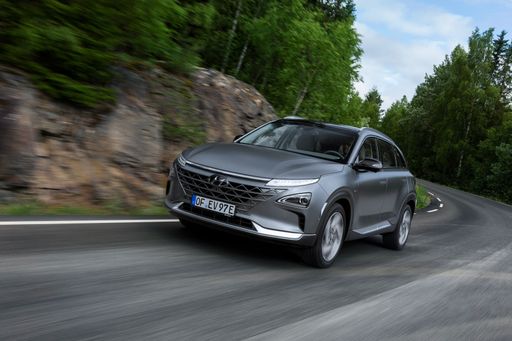 @ hyundai.news
@ hyundai.news
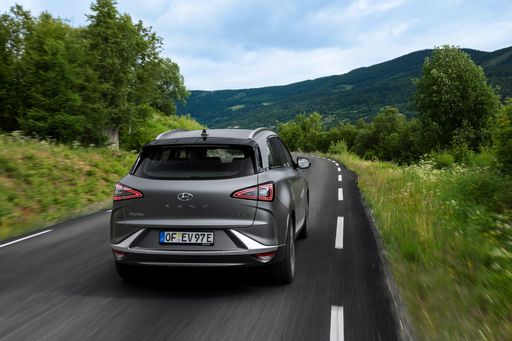 @ hyundai.news
@ hyundai.news
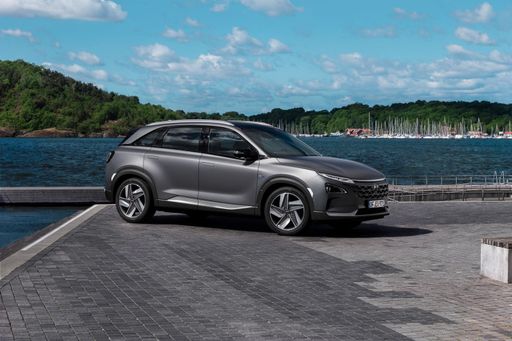 @ hyundai.news
@ hyundai.news
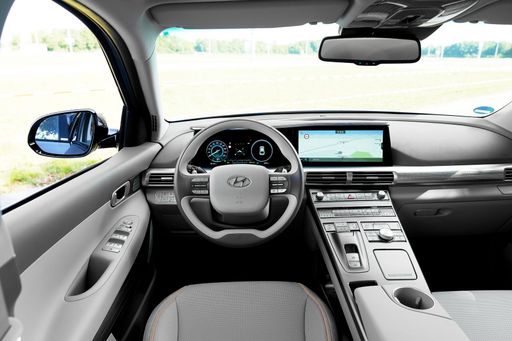 @ hyundai.news
@ hyundai.news
Jeep Compass
The Jeep Compass combines a rugged aesthetic with modern sophistication, making it a standout choice in the compact SUV segment. Its robust design is complemented by a comfortable interior that offers ample space and cutting-edge technology for a seamless driving experience. Whether tackling urban environments or venturing off-road, the Compass provides versatility and reliability, embodying the adventurous spirit synonymous with the Jeep brand.
details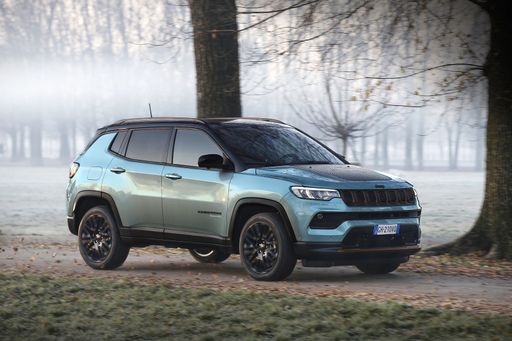 @ media.stellantis.com
@ media.stellantis.com
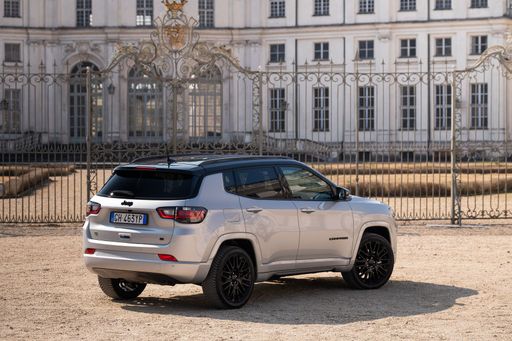 @ media.stellantis.com
@ media.stellantis.com
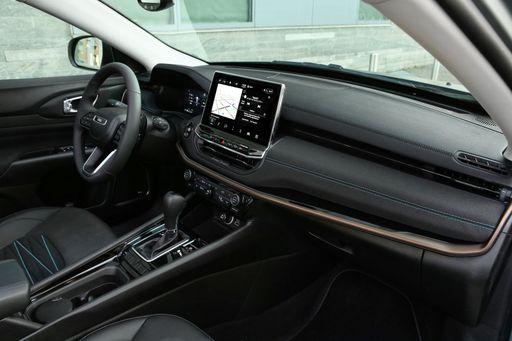 @ media.stellantis.com
@ media.stellantis.com
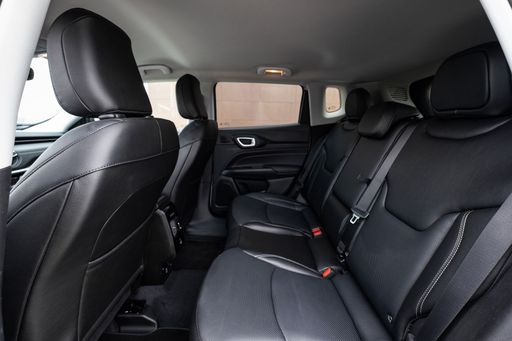 @ media.stellantis.com
@ media.stellantis.com
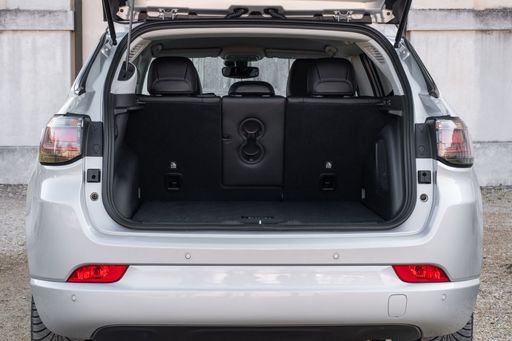 @ media.stellantis.com
@ media.stellantis.com

|

|
|
|
|
Costs and Consumption |
|
|---|---|
|
Price
66400 - 71000 £
|
Price
33900 - 46900 £
|
|
Consumption L/100km
-
|
Consumption L/100km
2 - 5.5 L
|
|
Consumption kWh/100km
-
|
Consumption kWh/100km
-
|
|
Electric Range
666 km
|
Electric Range
36 km
|
|
Battery Capacity
-
|
Battery Capacity
-
|
|
co2
0 g/km
|
co2
48 - 124 g/km
|
|
Fuel tank capacity
6 L
|
Fuel tank capacity
36 - 55 L
|
Dimensions and Body |
|
|---|---|
|
Body Type
SUV
|
Body Type
SUV
|
|
Seats
5
|
Seats
5
|
|
Doors
5
|
Doors
5
|
|
Curb weight
1889 kg
|
Curb weight
1575 - 1935 kg
|
|
Trunk capacity
461 L
|
Trunk capacity
420 - 438 L
|
|
Length
4670 mm
|
Length
4404 mm
|
|
Width
1860 mm
|
Width
1819 mm
|
|
Height
1630 mm
|
Height
1629 - 1649 mm
|
|
Payload
451 kg
|
Payload
465 - 470 kg
|
Engine and Performance |
|
|---|---|
|
Engine Type
Hydrogen
|
Engine Type
Petrol MHEV, Plugin Hybrid
|
|
Transmission
Automatic
|
Transmission
Automatic
|
|
Transmission Detail
Reduction Gearbox
|
Transmission Detail
Dual-Clutch Automatic, Automatic Gearbox
|
|
Drive Type
Front-Wheel Drive
|
Drive Type
Front-Wheel Drive, All-Wheel Drive
|
|
Power HP
163 HP
|
Power HP
130 - 240 HP
|
|
Acceleration 0-100km/h
9.2 - 9.5 s
|
Acceleration 0-100km/h
7.3 - 10.3 s
|
|
Max Speed
177 - 179 km/h
|
Max Speed
183 - 200 km/h
|
|
Torque
395 Nm
|
Torque
240 Nm
|
|
Number of Cylinders
-
|
Number of Cylinders
4
|
|
Power kW
120 kW
|
Power kW
96 - 177 kW
|
|
Engine capacity
-
|
Engine capacity
1332 - 1469 cm3
|
General |
|
|---|---|
|
Model Year
2018 - 2021
|
Model Year
2024
|
|
CO2 Efficiency Class
A
|
CO2 Efficiency Class
D, B
|
|
Brand
Hyundai
|
Brand
Jeep
|
Hyundai Nexo
Introducing the Hyundai Nexo: A Step into the Future of Automobiles
The Hyundai Nexo represents a groundbreaking stride in the realm of hydrogen-powered vehicles, aligning cutting-edge technology with environmental sustainability. As an SUV, it offers an impressive blend of performance, efficiency, and style, challenging the conventional norms of automotive engineering.
Advanced Hydrogen Technology
At the heart of the Hyundai Nexo's innovation is its hydrogen fuel cell powertrain, a marvel that enables the vehicle to achieve zero CO2 emissions, boasting a remarkable CO2-Effizienzklasse of A. This SUV offers the dual advantages of an eco-friendly footprint with the substantial performance of a traditional combustion engine.
Impressive Performance Metrics
Equipped with a robust 120 kW (163 PS) motor, the Nexo can accelerate from 0 to 100 km/h in a commendable span of 9.2 to 9.5 seconds. This makes the Nexo not just a green choice but also a viable option for those who value brisk acceleration and dynamic driving capabilities. Furthermore, the vehicle manages a top speed of 177 to 179 km/h, showcasing its ability to hold its own on motorways.
Efficient Design and Spacious Comfort
The Nexo’s dimensions, at 4670 mm in length, 1860 mm in width, and 1630 mm in height, underline its role as a spacious and practical SUV. Inside, it comfortably seats up to five occupants, ensuring a luxurious ride experience complemented by its 461-litre boot capacity, ideal for both daily commutes and longer journeys.
State-of-the-Art Features
Hyundai's commitment to excellence is evident in the Nexo’s suite of advanced features. The Prime-Paket trim offers sophistication and practicality, integrating seamless technology with high-quality materials that redefine interior comfort and style. Despite its avant-garde hydrogen technology, Hyundai hasn't compromised on the intuitive user experience.
Cost and Efficiency Analysis
With monthly running costs between €1680 and €1786 and variable costs per kilometre from 67.2 to 71.5 cents, the Hyundai Nexo is an investment in future-oriented automotive excellence. Its distinctive lack of CO2 emissions assures potential owners of its sustainability, while its running costs reflect the premium nature of its innovative technology.
Conclusion: The Future is Hydrogen
The Hyundai Nexo serves as a testament to the potential of hydrogen as a mainstream fuel source. By offering leading-edge technology, notable performance, and unbeatable efficiency, the Nexo positions itself as a beacon of future mobility. For those ready to embrace the next chapter of automotive evolution, the Nexo awaits as a stellar option.
Jeep Compass
Exploring the Jeep Compass: A Modern SUV with Innovative Features
The Jeep Compass continues to challenge the boundaries of what an SUV can be, offering a blend of practicality, efficiency, and rugged appeal. This model, distinguished by its diverse range of powertrains, promises to cater to various needs and preferences. From urban commuting to exploring off-road trails, the Compass delivers with aplomb.
Engine Versatility and Performance
Under the bonnet, the Jeep Compass offers a diverse lineup of engines designed to meet varying driver demands. With options ranging from mild hybrid petrol engines to advanced Plug-in Hybrid Electric Vehicles (PHEVs), the Compass provides both efficiency and power. This impressive engine choice results in power outputs from 130 to 240 PS, ensuring that there is a model suitable for both city driving and more ambitious off-road excursions.
Performance devotees will appreciate the Compass's quick acceleration, clocking 0-100 km/h in as little as 7.3 seconds. Meanwhile, fuel economy remains commendable, with consumption figures between 1.7 to 5.5 litres per 100 kilometres, making the Compass an economical choice for daily driving.
Innovative Hybrid Technology
The Jeep Compass brings cutting-edge hybrid technology to the forefront. The available plug-in hybrid variants offer electric-only driving ranges of up to 53 kilometres, ideal for environmentally conscious urban drivers. This zero-emission capability makes short trips sustainable without compromising on the flexibility offered by the internal combustion engine for longer journeys.
Dynamic Drivetrain Options
One of the main talking points of the Compass is its adaptable drivetrain options, which include both front-wheel drive and all-wheel drive systems. The 4xe PHEV models particularly stand out with their all-wheel drive, providing enhanced stability and traction suitable for varying terrains. Additionally, the automated transmission ensures smooth gear changes and an overall comfortable driving experience.
Design and Comfort
Beyond performance, the Jeep Compass excels in providing a stylish and functional environment. The SUV's dimensions, ranging between 4398 to 4404 mm in length and up to 1874 mm in width, offer ample interior space for both passengers and cargo. The boot space varies from 420 to 438 litres, accommodating the needs of families and adventure-seekers alike.
With seating for five, maximum comfort is assured, thanks to high-quality materials and thoughtfully designed interiors. The Compass integrates advanced technology seamlessly into its cabin, ensuring easy connectivity and an engaging driving experience.
Safety and Efficiency
Safety is paramount in the Jeep Compass, with a range of driver assistance features providing peace of mind. The model adheres to impressive CO2 efficiency standards, boasting a CO2 emission range between 37 and 123 g/km, making it both a responsible and reliable choice.
Furthermore, the Compass offers competitive running costs, with monthly expenses ranging from €1,095 to €1,315, and an average cost per kilometre between 43.8 and 52.6 cents. This cost-effectiveness further underscores the Compass’s value proposition.
Conclusion
Overall, the Jeep Compass stands out as a richly equipped, versatile SUV, ready to tackle urban or off-road challenges. With its blend of powertrain innovations, superior performance, and sophisticated design, it redefines what’s possible in the SUV segment. Whether for efficient city driving or adventurous journeys into the unknown, the Compass is ready to rise to the occasion.
The prices and data displayed are estimates based on German list prices and may vary by country. This information is not legally binding.
